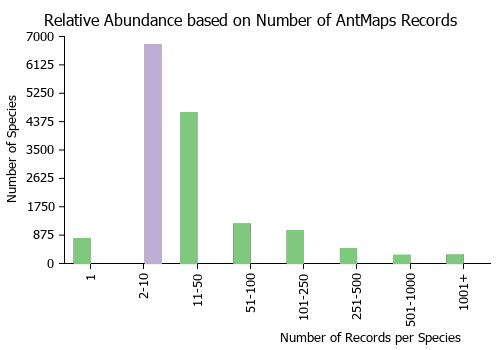Strumigenys gamegyn
| Strumigenys gamegyn | |
|---|---|

| |
| Scientific classification | |
| Kingdom: | Animalia |
| Phylum: | Arthropoda |
| Class: | Insecta |
| Order: | Hymenoptera |
| Family: | Formicidae |
| Subfamily: | Myrmicinae |
| Tribe: | Attini |
| Genus: | Strumigenys |
| Species: | S. gamegyn |
| Binomial name | |
| Strumigenys gamegyn Bolton, 2000 | |
Known from the holotype worker, it was found along a forest path in a rotten twig.
Identification
Bolton (2000) - A member of the signeae complex in the Strumigenys godeffroyi-group. Density and intensity of sculpture on disc of postpetiole may be variable here, as in Strumigenys sytaria. See notes under Strumigenys mocsaryi.
Keys including this Species
Distribution
Distribution based on Regional Taxon Lists
Indo-Australian Region: Indonesia (type locality).
Distribution based on AntMaps
Distribution based on AntWeb specimens
Check data from AntWeb
Countries Occupied
| Number of countries occupied by this species based on AntWiki Regional Taxon Lists. In general, fewer countries occupied indicates a narrower range, while more countries indicates a more widespread species. |

|
Estimated Abundance
| Relative abundance based on number of AntMaps records per species (this species within the purple bar). Fewer records (to the left) indicates a less abundant/encountered species while more records (to the right) indicates more abundant/encountered species. |

|
Biology
Castes
Nomenclature
The following information is derived from Barry Bolton's Online Catalogue of the Ants of the World.
- gamegyn. Strumigenys gamegyn Bolton, 2000: 822 (w.) INDONESIA (Java).
Unless otherwise noted the text for the remainder of this section is reported from the publication that includes the original description.
Description
Worker
Holotype. TL 2.5, HL 0.70, HW 0.52, CI 74, ML 0.28, MI 40, SL 0.38, SI 73, PW 0.30, AL 0.71. Characters of signeae-complex. Apicoscrobal hair weakly remiform; dorsolateral margin of head posterior to this with 2-3 similar but shorter projecting hairs. Cephalic dorsum with a transverse row of 4-6 erect hairs at occipital margin; without standing hairs anterior to this. Pronotal humeral hair stiff and straight, long-spatulate to weakly remiform; pronotal dorsum otherwise without erect hairs. Mesonotum with a single pair of stout erect hairs. Entire dorsal alitrunk reticulate-punctulate. Katepisternum mostly smooth but side of alitrunk otherwise entirely reticulate-punctate. Lamella on propodeal declivity concave immediately below tooth but lower on declivity forming a broadly convex lobe. Petiole node in dorsal view slightly broader than long, reticulate-punctate. In profile lateral spongiform lobe of petiole small, confined to posterolateral portion of node; height of anterior face of node less than length of dorsum. Disc of postpetiole almost unsculptured centrally, with only traces of feeble superficial punctulae; periphery of disc with sculpture more obvious. First gastral tergite with weakly remiform stout standing hairs. Basigastral costulae shorter than disc of postpetiole.
Type Material
Holotype worker, Indonesia: Java, Tjibodas, 28.x.1973, rotten twig, forest path (B. Bolton) (The Natural History Museum).
References
- Bolton, B. 2000. The ant tribe Dacetini. Memoirs of the American Entomological Institute. 65:1-1028. (page 822, worker described)
- Wang, W.Y., Soh, E.J.Y., Yong, G.W.J., Wong, M.K.L., Benoit Guénard, Economo, E.P., Yamane, S. 2022. Remarkable diversity in a little red dot: a comprehensive checklist of known ant species in Singapore (Hymenoptera: Formicidae) with notes on ecology and taxonomy. Asian Myrmecology 15: e015006 (doi:10.20362/am.015006).
References based on Global Ant Biodiversity Informatics
- Bolton B. 2000. The ant tribe Dacetini. Memoirs of the American Entomological Institute 65: 1-1028.
- IZIKO South Africa Museum Collection

